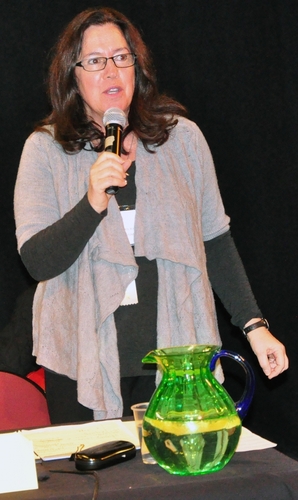BRATTLEBORO — Windham and Bennington County residents spoke out on March 26 about what they saw as barriers for southern Vermont women, and the Vermont Commission on Women (VCW) listened.
The VCW, a state agency working to help women achieve legal, social, economic, and political equality, approached the Women's Film Festival coordinators to host the listening forum as part of the festival.
The event at the New England Youth Theatre was the first listening forum held in the southern portion of Vermont in many years, said commission members.
Audience members identified the lack of public transportation, the inability to walk through Brattleboro free from harassing taunts, the lack of access to child care, and persistent poverty as issues standing between women and equality.
“We want all women in Vermont to have the opportunity to access all the opportunities our wonderful state has to offer,” said Commissioner Karen Henry of Brattleboro.
Pat Halloran, a former Newfane Selectboard member, opened the conversation by asking the four commissioners present how to persuade more women to serve in local government.
Halloran said that in her 30 years in the area, she could count on one hand the number of women who have served on the Selectboard.
Henry said that the VCW is looking “pretty heavily” into the reasons behind the lack of women in local government. Although Vermont can boast a high number of women serving at the state level, she said that few women and young people participate at the local level.
Janet Bullard, VCW office and program manager, said that the commission will be offering workshops called “Taking Your Place at the Table” to encourage women to serve in local government.
Numerous audience members brought up the mud pit of poverty that pulls down many Vermont women and children.
According to VCW Executive Director Wendy Love, many situations have landed over 20 percent of Vermont women in poverty.
Love added that poverty hits the very young, such as single mothers with small children, and the very old. In general, retired women's Social Security checks tend to be smaller than those of most men, she said.
Rep. Michael Mrowicki, D-Putney, said that he has seen two types of poverty in his work with families through Putney Family Services. The first he called “situational poverty,” where a life circumstance, such as divorce or sudden illness, knocks a family for an economic loop. The second he called “generational poverty,” when an event like an early pregnancy or trauma creates a cycle of poverty.
But in his experience, said Mrowicki, 95 percent of women living in poverty who access post-secondary education “get off public assistance and don't go back.”
Other members of the Windham County delegation present at the forum were Reps. Mollie Burke, P/D-Brattleboro, Sarah Edwards, P/D- Brattleboro, Valerie Stewart, D-Brattleboro, and Sen. Peter Galbraith, D-Windham.
“One elephant in the room is child care,” said Stewart. “And until we address [this issue], we will never level the playing field.”
One audience member, who mentioned that she had worked for many state agencies, said that she wanted to raise an “uncomfortable” subject. The audience member said that she has witnessed the very agency employees meant to help clients humiliate them.
At the root
Several audience members noted that life circumstances like teen pregnancy or poverty are symptoms of a larger societal disease: women are not equal to men.
Young women have kids because they feel that their lives have no other purpose, said Danielle Southwell, who works for Youth Services.
“[But] these young women become motivated, because they have children, to improve their lives,” Southwell said.
“We need to give our time and attention to looking at what's behind the violence and lack of funding [for women's organizations],” said Wayne Davis of Arlington.
Nancy Mills, of Bennington, said that in her opinion, the root cause of teen pregnancy had more to do with underlying issues like low self-worth, abuse, and poverty, than access to sex education.
Another female audience member said that society likes to think that sexism doesn't exist, and that there is much work to do regarding “awareness around respecting women and girls.” She said that she thought the educational system could better address keeping girls' self-respect high and teaching about the level of treatment of women that “is acceptable in our world.”
Women's Freedom Center co-director Donna Macomber expressed gratitude to be part of a community that supports organizations working on behalf of women and girls because “it's not always a level playing field.”
A concern for Macomber, however, was an “erosion” of the language used to discuss issues affecting women.
She said that men perpetuate 98 percent of the violence against women. “Be mindful not to camouflage” the situation with terms like “family violence,” Macomber urged, and remain clear about who perpetuates the violence.
Less than 100 years
Commissioner Carol Buchdahl of Saxtons River, who moderated the forum, said afterward that the conversation was “energizing,” and that she thought the audience showed courage speaking candidly to the commissioners.
Speaking from her personal experience of serving 12 years on the VCW, Buchdahl said, she's heard the same issues raised over and over again.
Despite the strides made by women, the changes are slow and still new, said Buchdahl. The right to vote is less than 100 years old, for example, and many of society's frustrations still come down on women “when the going get's rough.”
Still, Buchdahl sees some light on the horizon, such as initiatives by the VCW and the Department of Corrections to work with incarcerated women. She is also encouraged by the number of women chairing committees in the Legislature.
According to the commission's website, the VCW was established in 1964 and is one of the oldest women's commissions in the country. Former Gov. Philip Hoff set up the commission in response to President John F. Kennedy's 1962 establishment of the President's Commission on the Status of Women.
To learn more about the Vermont Commission on Women visit http://women.vermont.gov".
